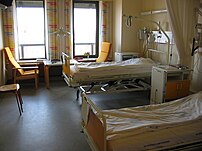 Image via Wikipedia
Image via Wikipedia
That the American healthcare delivery system is out of control and wasteful is a no-brainer.
Needless battery of investigations and over diagnosis, branded drugs, impractical insurance laws, free-markets approach to health care and sedentary lifestyle are all major factors in creating the current scenario.Its like a bad spiraling black hole which only sucks you into unnecessary and wasteful consumption of health services.
Keeping the whole machinery ticking seems to be the raison d'itre de patient existence.
This video below touches on a few reasons on why health care is so expensive in America. Features like this convince that India must be doing something right in its public health policy. I have been a member of Public health delivery system for about 10 years, in a wide range of positions and institutions. I fully appreciate Indian obstacles (population) and limitations (poverty) in public health delivery. A good step has been taken with the Swasthya bima (govt. sponsored health insurance with private partners). This Indian central govt scheme for BPL (Below poverty line) families is built on sound understanding of indian conditions and mindset. Eighteen states, including Rajasthan, have already launched this scheme. What is needed now is to make sure ALL BPL families OBTAIN an insurance smartcard. NGOs need to come forward to ensure all BPL families get their smartcards. The cost of the insurance is Ruppees 750/- annualy, 75% paid by central govt. and 25% state govt. The consumer would have to pay an annual Ruppees (Thirty) 30/- as registration/renewal fees. Then they would be able to use services at all public hospitals, many private hospitals and most specialist health care institutions all over the country with the help of a single smartcard!! The claims section of the scheme still has to show efficiency. But all in all, its a very well thought out scheme and should work wonders in more ways than one.
----------------------------
------------------------
![Reblog this post [with Zemanta]](http://img.zemanta.com/reblog_a.png?x-id=9a872465-6dda-43d5-9422-4ab197a1c632)
![Reblog this post [with Zemanta]](http://img.zemanta.com/reblog_a.png?x-id=3e147898-39f0-4e4a-ac40-9542df9172f3)

